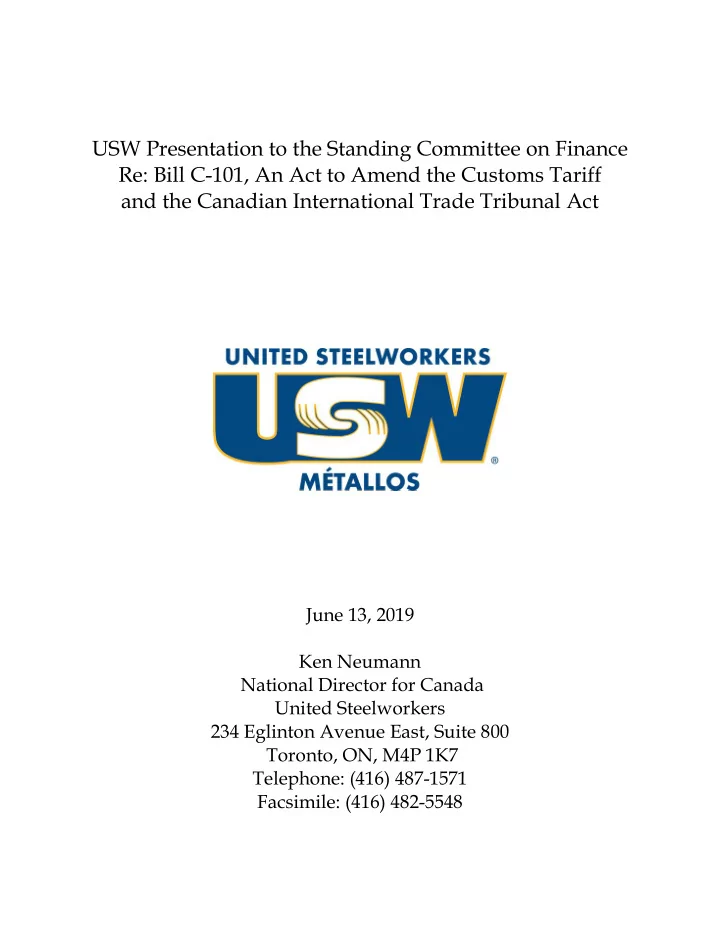

USW Presentation to the Standing Committee on Finance Re: Bill C-101, An Act to Amend the Customs Tariff and the Canadian International Trade Tribunal Act June 13, 2019 Ken Neumann National Director for Canada United Steelworkers 234 Eglinton Avenue East, Suite 800 Toronto, ON, M4P 1K7 Telephone: (416) 487-1571 Facsimile: (416) 482-5548
Thank you for allowing me, on behalf of our members in the steel and aluminum industries, to address this committee to discuss Bill C-101. As you know, the Steelworkers union has been at the forefront in advocating for strengthened trade measures to protect the domestic steel industry. At least 22,000 workers in Canada are directly employed in the steel industry, with another 100,000 indirectly employed. The United Steelworkers is by far the largest union in the steel sector. We are especially concerned for our members working in industries that are threatened by import surges, particularly as much of the world closes or restricts its steel markets. We support Bill C-101, but would also like to see concrete measures in place to protect Canadian steel markets and workers. This last year has been particularly difficult for our members in the Canadian steel industry. Over the last 8 months or so, we have seen over 700 temporary and permanent layoffs in communities from Calgary Alberta, to Sault St. Marie and Hawkesbury Ontario and Montreal Quebec. Moreover, the uncertainty created by the current steel trade situation has severely curtailed the industry’s willingness to invest in Canadian steel facilities. As we speak today, our steel sector and workers are still at risk from predatory practices of foreign producers who flout fair trade rules and who are now shut out of other markets. It is critical that the federal government impose measures to stabilize our market and defend national interests. As it is, the Canadian steel industry is vulnerable, while the U.S., Mexico and Europe have taken strong action to defend their steel industries. The USW worked tirelessly to ensure that the illegal U.S. tariffs on Canadian steel and aluminum products were removed and that they would not be replaced with a quota. We are pleased that they have finally been removed. However, the agreement to remove the tariffs included provisions stating the U.S. has the ability to re-impose tariffs should there be a surge in imports into Canada. Amendments to the Custom Tariff that would allow Canada to protect its markets from the threat of import surges must not be symbolic. It is important that amended power under Bill C-101 be used to impose concrete measures to protect Canadian steel markets and steel workers.
In the period during the initial imposition U.S. Section 232 tariffs on much of the world, Canada experienced a surge in imports from non-NAFTA countries, requiring temporary safeguards on seven steel products. Just as an example, overall imports of steel into Canada surged by more than 140 per cent from some countries in the aftermath of the Section 232 tariffs. The provisional safeguards imposed last October were working to stabilize the Canadian steel market during this turbulent time. With our ability to participate in trade cases before the Canadian International Trade Tribunal, the USW was heavily involved in this year’s hearings related to permanent safeguards on seven steel products. Our members produce six of the seven products that were considered in those hearings -- rebar, energy tubular, hot-rolled sheet, heavy plate, wire rod and pre-painted. We were disappointed with the recommendations of the CITT, with the Department of Finance’s decision not to extend safeguards on five of the products. Our concern is that this decision puts our members at risk, should there be a surge in imports from countries seeking to avoid tariffs in the United States, or that have met their quotas in European markets. The U.S. maintains its 25-per-cent tariff on most of the world. Earlier this year in February, the European Union announced that its provisional safeguard measures -- tariff-rate quotas -- on 26 steel products would become permanent and should remain in place for three years. As I have stated, it is our view that Canada cannot continue as one of the few countries in the world that allows foreign steel to flood into its markets. The federal government must protect producers and workers – it’s as simple as that. Bill C-101 is a good first step, and we urge Parliament and the Senate to pass this legislation as quickly as possible. But we would also add that government action must go further to ensure the stability of the Canadian steel market. Further steps must be taken, including the re-imposition of safeguard measures on the five products that had been subject to safeguard measures before April. Thank you for the opportunity to address this committee and I look forward to your questions.
Recommend
More recommend